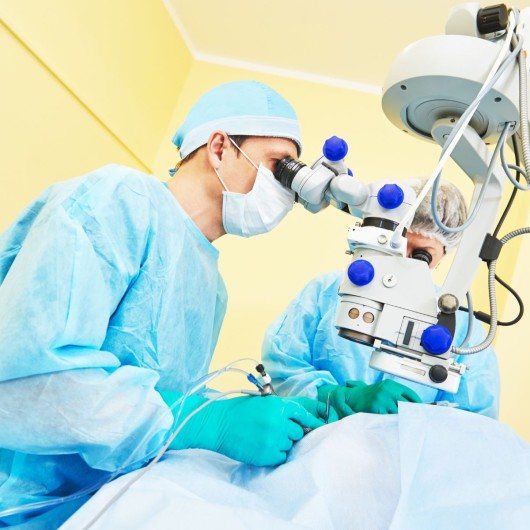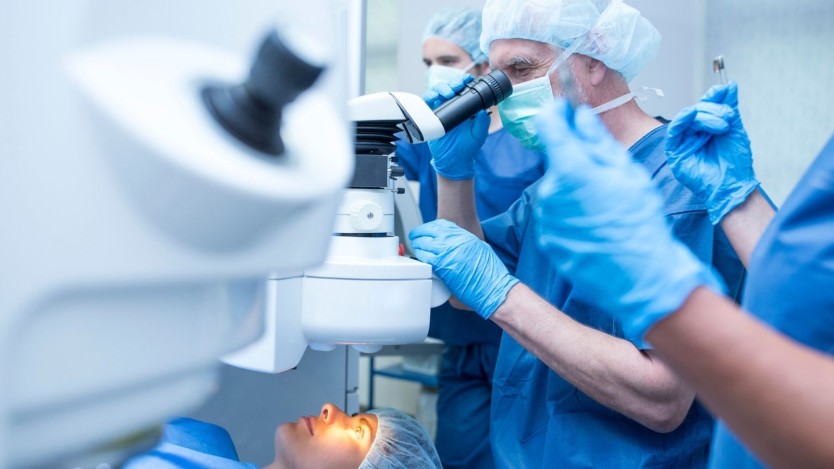
Presbyopia surgery with Trifocal lens replacement
- Stay in clinic: Ambulatory
- Surgery time: 15 - 20 min (per eye)
- Anaesthesia: Topical
- Full recovery: 1-2 days
Fixed price Per eye
2.700 €
All included
Financing
from 124 €/month
Financing is available* for amounts over €150, and can be financed from 3 and to 24 months. The financing process is subject to approval by the collaborating financial entities. For further information on the financing conditions, please do not hesitate to contact us at +34 91 141 33 56 or through this contact form. Our Patient Service department will provide you with the information you need and explain the financing process. Find additional information about funding in the following link. *Operarme’s team manages the funding of surgical procedures and medical tests. The financing management of dental services is only performed at Caser Dental Clinics.
What do our patients think?
What is included?
-
Free surgical consultation
Book a free consultation with our eye specialist to explore your options for presbyopia surgery. Get to know the doctor, discuss your case, and decide together on the best solution for you.
-
Pre-operation study
All the specific preoperative eye tests required for the procedure.
-
Surgical procedure expenses and fees
Reservation and booking of the operation room, instruments, equipment,consumables and medication of the surgical procedure. Medication, medical gases, Stay in the postoperative recovery room, monitorization and necesary treatments. Surgeon, assistant and anaesthetist fees until your medical discharge.
If there was any special need in the surgical process, by express indication of the doctor, the client will be informed of the variation in the price prior to surgery, and must be accepted to continue with the process.
-
Outpatient surgery
Presbyopia surgery is an outpatient procedure, so you'll be able to go home the same day.
-
Medical complications insurance
Presbyopia surgery with Trifocal lens replacement includes a medical complications insurance covering possible eventualities that may affect the patient during the surgical procedure and 365 days after surgical intervention, including reoperation if needed.
Medical complications insurance covers related surgical procedure expenses, such as:
- Increase in your hospital stay after surgery.
- Hospital admission after hospital discharge due to medical complications.
- Reoperation and hospital stay up to the established amount in the particular condition.
Emergency visits and follow-up consultations after medical discharge are not covered under any circumstances.
If you woud like to receive more information about this subject, please contact our patient service department.
-
Post-surgical consultation
One post-surgical consultation is included in the fixed price of this surgery. If additional consultations are needed, they must be arranged through the patient care team at Operarme and will be charged at a discounted rate. For more information or to request an additional consultation, please contact our patient care team.
Post-surgical consultations NOT included in the fixed surgical price are charged at €39 per appointment.
Information of Presbyopia surgery with Trifocal lens replacement
- 01. All about Presbyopia Surgery with Trifocal Lens
- 02. What is Presbyopia?
- 03. What is an Intraocular Lens?
- 04. What are Trifocal Lenses?
- 05. What does Presbyopia surgery with a trifocal lens involve?
- 06. Preoperative procedure for Presbyopia surgery with trifocal lens replacement
- 07. Step-by-Step: Presbyopia surgery with trifocal lens replacement
- 08. Recovery time after Presbyopia surgery with a trifocal lens
- 09. Risks and benefits of Presbyopia surgery with a Trifocal lens replacement
- 10. Cost of Presbyopia Surgery with a Trifocal Lens with Operarme
01. All about Presbyopia Surgery with Trifocal Lens
Presbyopia is a very common medical condition because it is a direct consequence of aging. Due to aging, the patient loses the flexibility of the lens and the muscles that help it focus, causing images to appear blurry on the retina.
Although this condition can be corrected with the use of simple glasses, many people are unwilling to wear them daily, whether for aesthetic reasons, work, or lifestyle.
In this case, the option of presbyopia surgery with a trifocal lens arises, allowing the patient to become independent of glasses, recovering the full range of vision, including short, medium, and long distances.
This is not possible with other types of lenses, which is why trifocal intraocular lenses are the best option.
02. What is Presbyopia?
Presbyopia is the loss of the ability to focus on objects at different distances due to the decreased flexibility of the muscles that control the lens accommodation.
This loss of flexibility is a result of aging, so experiencing presbyopia is no more unusual than having wrinkles or gray hair as you get older. It is, therefore, a very common eye condition, affecting nearly 100% of people over the age of 65.
One of the most common myths about presbyopia is that it’s caused by excessive focus use of the eyes, but it’s important to emphasize that it occurs because of aging.
The onset of presbyopia typically happens between the ages of 35 and 50. Its appearance may be influenced by having had other refractive errors in the past, such as farsightedness or nearsightedness.
Presbyopia cannot be corrected over time or with the use of eye drops, so the only viable solutions are the use of glasses, contact lenses, or undergoing a surgical procedure with intraocular lens implantation.
Presbyopia affects nearly 100% of people over the age of 65.
Unlike other eye conditions such as nearsightedness, farsightedness, or astigmatism, presbyopia is directly caused by aging and the resulting loss of flexibility in the lens and the muscles that allow it to focus.
The main symptoms of presbyopia are blurred vision up close, and in some cases, even at a distance, as well as the resulting eye fatigue, redness, and itching.
One of the most obvious signs that someone may be suffering from presbyopia is when they need to hold a book or mobile phone farther away in order to read what’s written.
As mentioned, it is a normal medical condition that occurs as we age and can be solved with the simple use of glasses or contact lenses. However, many people are unwilling to wear glasses daily for reasons related to aesthetics, work, or comfort.
In such cases, the most recommended option is presbyopia surgery with an intraocular lens. Of the different types of intraocular lenses, the most interesting option is the one performed with a trifocal lens.

Do you need presbyopia surgery with trifocal lens replacement?
Request a free and immediate appointment with our specialists
03. What is an Intraocular Lens?
We all have a natural lens inside the eye, the lens. Its function is to perceive light carrying information about objects and project it onto the retina. To do this, thanks to the muscles that hold it in place, it can adjust so that different distances can be perceived.
Trifocal Lens allows the patient to recover the full range of vision.
Intraocular lenses are an "artificial lens" specifically designed to perform the functions of the natural lens. This lens is implanted into the affected eye, replacing the natural lens.
The composition of the intraocular lens allows it to be flexible enough to be inserted into the eye through a tiny incision and recover its shape once inside the eye. In addition, its structure allows it to capture light from the outside and project it onto the retina depending on its intensity, enabling the perception of different distances.
There are different types of intraocular lenses: the monofocal lens, which only improves long-distance vision; the multifocal or bifocal lens, which improves both near and far vision; and the innovative trifocal lens, which allows for good vision quality at short, intermediate, and long distances.

04. What are Trifocal Lenses?
Trifocal lenses are the latest in ophthalmological technology to address cataracts or presbyopia (eye strain), as they help solve these visual deficiencies by restoring the ability to see across the entire range of vision, whether at long, short, or intermediate distances.
Additionally, trifocal lenses provide good visual quality in low-light conditions, minimizing the occurrence of nighttime halos.
Therefore, using this type of lens will allow the patient to almost completely do away with glasses or contact lenses. At the same time, like with any other type of intraocular lens, the risk of developing cataracts is eliminated.
05. What does Presbyopia surgery with a trifocal lens involve?
The presbyopia surgery with a trifocal lens replacement is performed in exactly the same way as other surgeries involving the implantation of an intraocular lens, as the only real difference is the type of lens used.
The surgical technique used to implant the trifocal lens is phacoemulsification. This is a minimally invasive surgery that allows the entire procedure to be performed through a tiny 2 cm incision.
However, before undergoing presbyopia surgery with a trifocal lens replacement, the patient must have one or two preliminary consultations with an ophthalmologist to determine the specific characteristics of their eye.
06. Preoperative procedure for Presbyopia surgery with trifocal lens replacement
During these preoperative consultations, the surgeon will perform a series of tests on the patient to assess the characteristics of the eye and ensure the surgery is carried out with the utmost safety and precision.
Usually, the tests conducted by the surgeon are:
- Thorough eye examination
- Pupilometry and intraocular pressure measurement
- Refraction with and without dilation
- Orbscan topography
- IOL Master biometry
- Specular microscopy
In addition to these ophthalmological tests, the surgeon will ask the patient for information about any previous eye surgeries and the use of medications or dietary supplements.
They will also discuss the suitability of using monofocal, bifocal, or trifocal lenses, depending on the patient’s lifestyle. In this case, the most recommended option is the trifocal lens due to its ability to restore the full range of vision.
The surgeon will prescribe antibiotic eye drops for the patient to use in the days leading up to the procedure to prevent possible infections.
The ophthalmologist will also advise the patient not to wear contact lenses for the week or ten days prior to surgery and to avoid using cosmetics or makeup around the eye area a couple of days before the procedure.

Schedule your surgery date in Spain with our specialists
Request now a free consultation with our specialists in Ophthalmology.
07. Step-by-Step: Presbyopia surgery with trifocal lens replacement
As mentioned earlier, the surgical technique used for presbyopia surgery with a trifocal lens is phacoemulsification. This technique is the same one used in all cataract surgeries where the natural lens is replaced with an intraocular lens.
This procedure does not require hospitalization and is performed under local or topical anesthesia. The difference between the two is that local anesthesia is administered through a series of injections around the eye, while topical anesthesia consists of eye drops that numb the eye directly.
- The patient enters the operating room and is placed on the surgical table. A surgical drape or gauze will cover the patient’s face, leaving only the eye to be treated. Anesthesia will then be administered.
- Once the anesthesia takes effect, the surgeon will keep the patient’s eye open using a surgical instrument that holds the eyelids in place.
- The ophthalmologist will then wash the eye and surrounding area with saline. During this process, the patient may feel pressure in the eye or even lose part of their vision temporarily, but there is no need to worry, as it is not a serious issue.
- The surgeon will make a small incision of about 2 cm at the edge of the cornea. Through this incision, a probe will be inserted, which uses ultrasound to dissolve the natural lens. The remaining liquid is then removed from the eye with a cannula.
The patient can leave the hospital immediately after the procedure, walking out on their own with their eye uncovered.
- The next step is to insert the trifocal lens into the eye cavity. This is done using a surgical instrument that allows the lens to be folded so that it can fit through the incision. Once inside, the trifocal lens will be placed in the exact position where the natural lens was, becoming imperceptible to the patient and integrating into the eye shortly after.
- Once this is completed, the surgeon may or may not suture the incision, as the small size of the incision allows it to heal on its own.
The replacement of the natural lens with a trifocal lens takes only between 20 and 30 minutes, and the patient can leave the hospital immediately after the surgery.
08. Recovery time after Presbyopia surgery with a trifocal lens
After undergoing lens replacement surgery with a trifocal intraocularlens to correct presbyopia, the patient can leave the clinic immediately after the procedure, with the eye uncovered and walking out on their own.
Recovery begins on the same day of the surgery, following the doctor's instructions. The patient will return to the clinic the next day for the first follow-up appointment, with additional check-ups scheduled throughout the first postoperative month.
The recovery period after presbyopia surgery with a trifocal lens lasts about 2 to 3 days before the patient can resume normal daily activities.
Vision gradually improves during the first week after surgery, with noticeable improvements within24-48 hours. Within 2 to 3 days following the procedure, the patient should be able to return to their usual routine.
To ensure the fastest and most effective recovery, the surgeon will provide specific instructions to avoid potential complications. In addition to prescribing antibiotic eye drops to prevent infections and aid healing, the patient will be advised to wear a protective eye shield while sleeping to prevent accidental rubbing or scratching during the night.
It is also important to use sunglasses and artificial tears to prevent eye dryness.
Lastly, it is crucial to avoid exposure to dust, water, or any foreign substances in the eye and to refrain from lifting heavy objects during the first week.
09. Risks and benefits of Presbyopia surgery with a Trifocal lens replacement
The main benefit of presbyopia surgery with a trifocal lens is the elimination of presbyopia itself, along with freedom from glasses, as it allows the patient to regain a full range of vision.
One advantage of trifocal lenses is that they enable patients to see at short, intermediate, and long distances, reducing the nighttime halos typically associated with bifocal lenses and providing high-quality vision even in low-light conditions.
Additionally, since this procedure replaces the natural lens with an artificial one, it completely eliminates the possibility of developing cataracts in the future.
On the other hand, there are some risks associated with presbyopia surgery. Like any other surgical procedure, this intervention carries some potential complications, although they are statistically very rare.
Possible risks include anesthesia-related issues, intraocular bleeding, increased intraocular pressure (glaucoma), retinal inflammation, or partial or complete vision loss.
It is important to note that this is a straightforward procedure when performed by an experienced surgeon, making the chances of complications extremely low.

10. Cost of Presbyopia Surgery with a Trifocal Lens with Operarme
The cost of Presbyopia surgery with a trifocal lens replacement is fixed and all-inclusive, meaning it covers everything necessary to perform the surgery with the highest level of safety, guaranteed by the quality of the hospital and the experience of the specialist.
The cost of the surgery with Operarme is 2.700 € per eye. This price includes:
- Operating room reservation and use
- Postoperative check-ups for 30 days after the procedure
- Medical fees
- Anesthesiologist fees
- Nursing team fees
- All necessary surgical materials, including the intraocular lens
- Anesthesia and recovery room reservation
- Medical complications insurance, covering any unlikely events that may occur
If you would like more information about this procedure or how Operarme works, feel free to contact us via our contact form, by calling at +34 91 141 33 56, or by scheduling a free surgical consultation with our Ophthalmology Specialists by clicking below:

Schedule your surgery date in Spain with our specialists
Request now a free consultation with our specialists in Ophthalmology.
Fixed price
2.700 €
All included
Financing
from 124 €/month
Financing is available* for amounts over €150, and can be financed from 3 and to 24 months. The financing process is subject to approval by the collaborating financial entities. For further information on the financing conditions, please do not hesitate to contact us at +34 91 141 33 56 or through this contact form. Our Patient Service department will provide you with the information you need and explain the financing process. Find additional information about funding in the following link. *Operarme’s team manages the funding of surgical procedures and medical tests. The financing management of dental services is only performed at Caser Dental Clinics.
Step by step
-
Ask for a free consultation with our specialist in Ophthalmology.
-
Information will be sent to your email address.
-
We will call you to confirm the date.
-
Meet the doctor and decide if you would like to have the surgical procedure with us.
-
Correct your presbyopia problem and regain your quality of life.
What do our patients think?
Frequent Questions
-
Do you have questions? Get free advice on contracting our medical services
Before requesting an appointment with our specialist, you may want to know a little more about the entire process in Operarme. Therefore, we offer you a free advisory service so that you can resolve any questions you may have:
- How is the surgery managed?
- What services are included?
- Can it be financed?
- What should I do if I don't have medical tests or reports ?
- What advantages do I get being an Operarme's patient?
Request the service by clicking below and our patient service team will contact you in less than 24 working hours. This service does not imply commitment to contract our services. Do not hesitate and request our assessment by clicking here:

Free Assessment for Contracting Medical Services
Operarme’s Patient Service will contact you and solve all your questions on the medical service you need.
Request information Request information -
Do I have to take a PCR test before surgery?
Currently our collaborating hospitals and surgeons do not ask patients to take a PCR test as a mandatory requirement to enter the operating room.
If exceptionally this test would be required by the hospital or surgeon, we inform you that the PCR test is not included in the price of the surgery.
If you have any questions about this specific issue, please contact our patient service department.

Presbyopia surgery with Trifocal lens replacement
- Stay in clinic: Ambulatory
- Surgery time: 15 - 20 min (per eye)
- Anaesthesia: Topical
- Full recovery: 1-2 days
Fixed price
2.700 €
All included
Financing
from 124 €/month
Financing is available* for amounts over €150, and can be financed from 3 and to 24 months. The financing process is subject to approval by the collaborating financial entities. For further information on the financing conditions, please do not hesitate to contact us at +34 91 141 33 56 or through this contact form. Our Patient Service department will provide you with the information you need and explain the financing process. Find additional information about funding in the following link. *Operarme’s team manages the funding of surgical procedures and medical tests. The financing management of dental services is only performed at Caser Dental Clinics.


